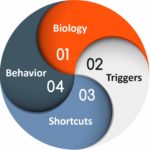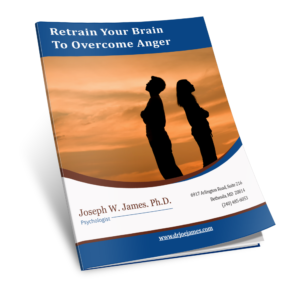6917 Arlington Road Suite 216
Bethesda, MD 20814
Day, Evening and Weekend Appointments Available
 In all my years as a psychologist developing and teaching anger management I have heard client after client describe the losses their anger has cost them. Through all the pain, the one consistency I have heard is how misunderstood most people who struggle with anger management feel. The trouble for many is not the point they are trying to make, but the way they are trying to make it. Its rare that I treat a person struggling with anger management who didn’t on some level have a valid point to make. The problems begin when you lose control and become aggressive in making that point. Instead of effectively dealing with the problem you end up being seen as the problem. This can leave you feeling unheard, misunderstood, blamed, and oftentimes even angrier than you were to start with.
In all my years as a psychologist developing and teaching anger management I have heard client after client describe the losses their anger has cost them. Through all the pain, the one consistency I have heard is how misunderstood most people who struggle with anger management feel. The trouble for many is not the point they are trying to make, but the way they are trying to make it. Its rare that I treat a person struggling with anger management who didn’t on some level have a valid point to make. The problems begin when you lose control and become aggressive in making that point. Instead of effectively dealing with the problem you end up being seen as the problem. This can leave you feeling unheard, misunderstood, blamed, and oftentimes even angrier than you were to start with.
In helping hundreds of clients overcome their anger management problem I’ve learned that stuffing anger or pretending problems don’t exist are dead end approaches. You can’t go through life without injustices occurring and feeling angered about it. To help my many clients I developed a systematic program that can teach you to deal with anger in different ways; ways that will leave you feeling empowered and in control.
This program is unique in that it approaches anger from 4 different angles, what I call
“The Four Horsemen of Anger”
1. Biology. Because your emotional brain has a jump start on your thinking brain you’ll learn various strategies to keep take a layer or two of stress off throughout the day (making you less reactive) and to calm down when triggered.
2. Triggers. Why is it that something can be very upsetting to one person but not to another? Often your response is related to your history. Through experience, each of us has learned to perceive certain situations as threatening or triggering. Since we have all had different experiences we each see different things as upsetting.
You’ll explore what your triggers are, what the underlying (i.e. primary emotions) are and use these to have a better understanding of specifically how to react differently.
3. Shortcuts. Did you know that much of the time we use mental shortcuts to figure out what is going on around us? Usually, these shortcuts are an efficient way to deal with life. Your conscious brain is only able to process 55 bits of info a second (whereas your unconscious brain is processing 11,000,000 bits per second) so if you really thought in depth about everything going on around you your brain would quickly become overwhelmed.
The problem with mental shortcuts in anger issues is that they lead you to either misperceive a situation or they give you tunnel vision and limit your ability to think through all your options.
I’ll show how to become aware of what your mental shortcuts are and how you use them to prime or fuel your anger, how to tune into them in everyday life, and how to change the way you are thinking about a situation before you end up in trouble.
4. Behavior. Insight and self-management skills are important, but they are only half the battle. The final piece of the puzzle is dealing with other people.
You’ll learn how to you talk to a difficult person in a non-confrontational way, How to you ask someone to change an annoying behavior without provoking a fight, how do you gracefully exit a tense situation and how to offer and respond to criticism.
Fulfilled: You are best friends and lovers in every sense of the word. You feel supported by and are supportive of one another. You can’t imagine a sharing your with a different partner.
Friendship: You are a team and may or may not feel like your partner is your best friend. But the passion is gone. It may feel more like you are running a business together than being lovers. There are some simmering resentments underneath that you can’t seem to resolve and your fights may have a repetitive quality to them.
Detached: You feel like two ships passing in the night. While you may each know your roles in keeping the house running there is no sense of teamwork. You have lingering disdain for one another. You are together more out of habit than any sense of passion or love.
One Foot Out the Door: You’re planning or fantasizing about your exit.

After over 25 years of practice I’m convinced that the hardest part of therapy is reaching out with that first phone call or first email to inquire about an appointment.
In all likelihood you came to this page because you’ve been struggling or suffering for quite awhile and you don’t seem to be able to find the answers on your own.
Chances are that if there were an answer you could find on your own you would have discovered it by now. Every day you wait makes it a little worse.
You don’t have to struggle on your own; give a call (240-485-6053) or drop a line (DrJoe@DrJoeJames.com) for a free 20-minute consultation where we can talk and figure out what the best course of action may be for you.

6917 Arlington Road
Suite 216.
Bethesda, MD 20814
Call: 240-485-6053
Day, evening and weekend appointments available.
